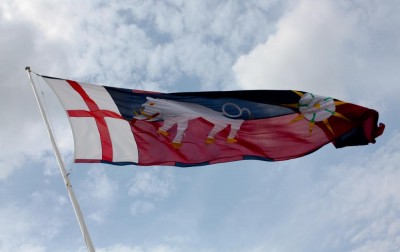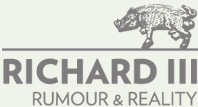Warfare

A modern flag of Richard III's now flying near the site of the battle of Bosworth. Troops sent by York may not have made it to this battle in time, but the city repeatedly raised money and men to support Richard as duke and king.
Keywords:
North-South Competition
Scotland
Display
Wars of the Roses
Other articles in this theme:
Description
Richard III's position as king was established, protected and defended with the help of military backing from the men of York and Yorkshire. The supply of fighting men was a critical aspect of Richard's relationship with the county both as duke of Gloucester and as monarch.
When he led campaigns into Scotland in 1480-82, troops from York and the nearby Ainsty district formed part of his retinue. The last campaign, in July 1482, saw Berwick-upon-Tweed brought back into English hands after more than twenty years when the castle surrendered on 24 August 1482. York had supplied 180 men for the campaign, which was a symbolic victory if a dubious one: its continued defence cost a huge amount for little strategic value. The city had struggled to pay those soldiers sent to fight, and the collection of taxes to fund them caused resentment among some citizens. The city council was consistent in its military support of Richard, however.
Soldiers were sent to London in June 1483 following his request for help against those said to be planning his destruction, the queen and her family, shortly before he claimed the throne on 26 June. Although the troops were unlikely to have arrived by then, they would have been present for his coronation on 6 July.
York's troops also joined forces with those protecting Richard's throne against the rebellion of the duke of Buckingham in October 1483, meeting with the king at Leicester. Almost two years later 80 soldiers were sent to defend the king against Henry Tudor, leaving York on 19 August 1485 and probably arriving too late to fight at the battle of Bosworth on 22nd, where Richard was killed.
For more on Bosworth and Richard's reign see the website of the Richard III Society here: http://www.richardiii.net/
Sources
Captain appointed for campaign against the Scots, 8 September 1481
"'John Brakenbury esquire to the maise shalbe capitan for the cite in this viage ayanest the Scottes, and John Hardewyk yoman seriant to the maise to attend uppon, and such other personez as may gudelie bei maid aswele of the cite as of Aynestie'"York House Books vol 1 p. 244
Civic leaders to each supply fighting men for the campaign to invade Scotland, 14 May 1482
"'The right high and myghti prince the duc of Gloucestr' by the grace of God intendeth brivelie in hys owen person to entre Scotland uppon Wedhenisday next commyng after this present date in subduyng the kynges greit enemye the kyng of Scottes and his adherentes, and for somuch as the said duc at all tymes have ben benevolent gude and gracius lorde to this cite, it was thoght… that the nobles and men of hanour of this cite that it war spedeful and also thankful to his said grace to send unto [hym] a certen people wele and defensable arraid in assisting of his said grace in [this] his said purpose… And over thys is is agreid be the hole counsell that wych of the aldyrmen that fayle to ffynd ij men [to fight] and wich of the xxiiijti that ffayle to ffynd j man shall pay to the use of the chambyr x li to be raysid of thar lands, gudes and catell with[out] ony pardon.'"York House Books vol 1 pp. 255-56
Citizens taxed to pay soldiers, 5 August 1482
"'The soghers of thys cite now beyng with my lord of Glowcestir beyn desolet of money [so] that a tax shall be rasid of the parishons of thys cite for vij days wages.'"York House Books vol 1 p. 262
Resentment over the payment of soldiers, 30 December 1482
"'John Lam… [was accused of saying] that the sochers beyng furth in the last viage made by my lord of Gloucestir gud grace… was ill worthi to have thar waghys, for tha dyd nothyng for it bot made whypys of thar bow strynges to dryve cariage with… John Lam denyd the said langage and said that he said not so, bot that he said that he hard sum of thar ffellyship say that tha dyd nothyng els bot waitid apon the ordinauns and cariage.'"York House Books, vol 1 p. 273
Richard's request for help against the queen, 10 June 1483
"'As ye love the wele of us and the wele and surtie of your own selff, we hertely pray you to come unto us to London in all the diligence ye can possible, aftir the sight herof, with as mony as ye can make defensibly arraied, thair to eide and assiste us ayanst the quene, his blode adherenttes and affinitie, which have entended and daly doith intend to murder and utterly destroy us and our cousyn the duc of Bukkyngham and the old royall blode of thie realme, and as it is now openly knowen by their subtile and dampnabill wais forcasted the same, and also the finall distruccion and disheryson of you and all odir thenheritourz and men of haner, as weile of the north parties as odir countrees.'
"York House Books, vol 2 pp. 713-14
Northern soldiers in London as Richard III became king, 26 June 1483
"'Armed men in frightening and unheard-of numbers were summoned from the North, from Wales and from whatever other districts lay within their [Richard and the duke of Buckingham's] command and power'
"N. Pronay and J. Cox (eds.) The Crowland Chronicle Continuations: 1459-1486 (London, 1986) p. 159
Soldiers sent to the king at Bosworth , 19 August 1485
"'It was determyned… that iiijxx men of the citie defensible araiyed, John Hastinges gentilman to the mase being capitayn, shuld in al hast possible depart towardes the kinges grace for the subduyng of his ennemyes.'
"York House Books, vol 1 pp. 367-68


